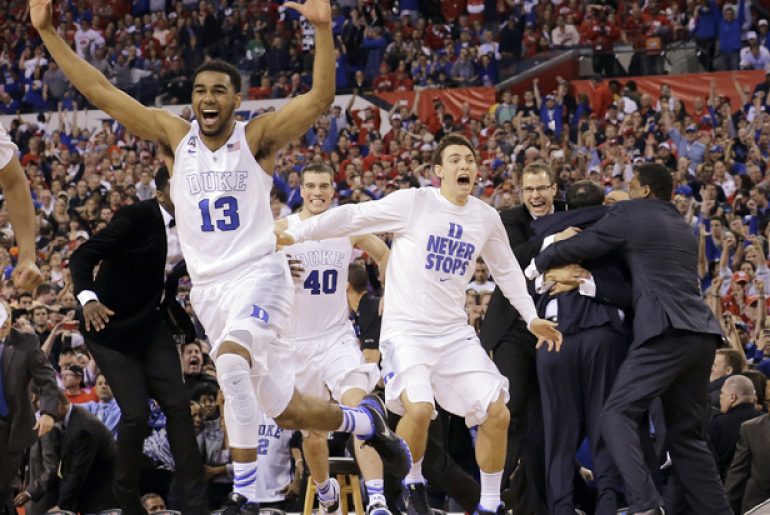In his first few days in office Trump and several members of his team attacked the media for underestimating the size of the crowd that attended the Inauguration. Trump argued that, “I turn on the networks, and they show an empty field. I’m like, wait a minute. I made a speech. I looked out, the field was, it looked like a million, million and a half people.” This could have been labeled just another off-the-cuff remark that has endeared Trump to political-incorrectness-fundamentalists, but later that day the baton was passed to his Press Secretary Sean Spicer who expanded on Trump’s argument claiming that, not only had Trump’s crowds and viewership been larger than the media reported, but that it had been “the largest crowd ever to witness an Inauguration”. Ever. The largest crowd ever. With her eye on the finish line, Trump’s Senior Counselor Kellyanne Conway took the baton and…
[This article originally appeared on Huffington Post. http://www.huffingtonpost.com/entry/fuckery-donald-trump-lies_us_588126a8e4b096b4a230a23f?fx74o5hg6bf6tuik9] In his 1987 comedy film, “Raw,” Eddie Murphy jokes about an argument with fellow comedian Bill Cosby about Murphy’s use of profanity. According to Murphy, Cosby’s son Ennis watched Murphy’s stand-up special and told his dad of Murphy’s foul language. Ennis was a fan; Cosby was not. Being an elder statesman in business, Cosby called Murphy to express his outrage at Murphy’s cursing ― what Cosby called, in Murphy’s elaborate recounting of it, “filth, flarn, filth, flarn filth!” Eddie Murphy was offended. He had managed to “put some jokes between the curses” he argued. No audience would pay for a “curse show,” where a comedian walks out on stage, drops some profanity, grabs his crotch, then collects a check. To focus on Murphy’s foul language was to miss his command of the craft and the relationship a comedian cultivates with the audience, he…
[This article originally appears on the Society for US Intellectual History blog http://s-usih.org/2015/02/invisible-men.html.] In his seminal works – Shadow and Act and Invisible Man – Ralph Ellison created two metaphors that speak to one of America’s great dilemmas regarding African Americans: how do Americans reconcile their beliefs in ‘democracy’ with certain ‘anti-democratic’ practices? The first appears in Shadow and Act, a book of essays, in which Ellison describes the African American as a Giant upon whom all of American history ‘unfolds’, a ‘human natural resource’ that must be restrained to preserve national power and stereotyped to preserve national innocence.[1] The second metaphor, the ‘battle royal’, appears in an earlier work The Invisible Man which explores what happens when the metaphorical giant attempts to break the chains and shape its destiny.[2] While both metaphors spoke explicitly to slavery and Jim Crow, they echo today in a variety of American institutions, the…
[This piece originally appeared in Salon.com: http://www.salon.com/2015/04/07/march_madness_and_the_ncaa_purity_lie_how_the_billion_dollar_basketball_industrial_complex_blinds_us_to_our_biggest_flaws/] In a nation split by partisan bickering, one of the few documents that both liberals and conservatives await with genuine enthusiasm is President Obama’s March Madness bracket. Liberals hope to match it or best it. Conservatives hope to obliterate it, but unlike most hot political topics, it’s all in good fun, right? For many, March Madness is the ultimate return and escape: a return to a simpler, purer time; an escape from the crass concerns of corrupt professional sports. This perception is, of course, rooted in myth. This year’s March Madness tournament will earn the NCAA close to a billion dollars in revenue. TV ratings for CBS, who aired the tournament games, skyrocketed to an 18-year high. That this tangled mess of contradictions and hypocrisies is cause for celebration for anyone other than the NCAA — and CBS — is a sign of both the…
[This piece originally appeared in The Baffler: https://thebaffler.com/blog/freedom-fries] In his book Fast Food Nation, Eric Schlosser demonstrates the dominance of McDonald’s, not just in the context of the history of the fast food industry, but in the history of all industry. McDonald’s is the largest owner of retail property in the world. The company trains more Americans than the U.S. Army. The McDonald’s logo is more recognizable than the Christian cross. Ronald McDonald is second in popularity with children to only one figure—Santa Claus. By any (and every) measure, McDonald’s is a juggernaut. And yet the prospect of a $15 per hour minimum wage in Seattle has led this grand institution to turn, not to greater economies of scale or improvements in vertical integration, but to the Fourteenth Amendment—a law ratified in 1868, primarily to protect the rights of recently freed slaves. The McDonald’s corporation’s efforts to avoid the mandate…
Sports fans often imagine that they have a kind of partnership with their favorite teams: their cheers make a crucial difference in those final moments of the game; their ticket purchases make the team economically viable and thus competitive; their commitment to sameness protects the team against the forces of ‘political correctness’, ‘candy-assness’ and other meddling. So, when a star athlete jumps ship or a team leaves town or the team itself reaches a plateau and begins to appeal to a new audience, the old fans feel betrayed and neglected. The fan has in a sense lived vicariously through the team and its players – something I call ‘vicarious ballin’ – which I think explains some of the push back Michael Sam has gotten since coming out of the closet and pursuing a career in the NFL. Reactions to the Sam announcement have of course run the gamut from outright…
Civilizations are remembered for the monuments they build, but what is seldom explored is the degree to which those monuments define and in some cases destroy the peoples that created them. The act of building monuments often necessitates the creation of interconnected groups and institutions: someone to feed and house the workers; someone to manage the flow of information and documents; someone to procure materials; someone else to transport them. These groups, united by interests and profit, are what we today call ‘industrial complexes’ and played a pivotal role in building complex and resource draining structures in two seemingly unrelated places: Easter Island, a tiny island famous for huge statues called ‘Moai’ and the United States of America the prison capital of the world. Easter Island is a small scrap of land about 2300 miles from Chile and 1300 miles from Polynesia’s Pitcairn Islands. Stone statues called ‘Moai’ are the…
Wednesday night Arizona governor Jan Brewer vetoed SB1062, a controversial bill that was supposedly intended to protect the religious freedoms of businesses and individuals who might out of ‘sincere belief’ need to discriminate against gay patrons or gay weddings. The bill had all of the markings of a political stunt. It was big, vague, ill-conceived and promised to solve a problem that only exists at the margins while at the same time creating a myriad of new problems. The governor had vetoed a similar bill in 2012, so why did the Arizona legislature bother? A closer look at the sponsors of the bill and the political climate on the right – past and present – offers some possible answers. A peculiar thing happens when you Google the sponsors of SB 1062 – Reps Nancy Barto, Bob Worsley and Steve Yarbrough. Once you wade through the blistering attacks and criticism by…
In writing the movie “Dr. Strangelove”, Stanley Kubrick and his co-writers faced a problem. They had set out to write a serious movie about the dangers of nuclear proliferation, but every time they talked about the characters and their interactions they began to laugh – hysterically. There was nothing inherently funny about mushroom clouds, war rooms, bomb shelters or apocalyptic wastelands, but the notion of creating weapons that could wipe out all human life on earth for the sake of ‘security’ was so ridiculous that it was hilarious. Sometimes comedy gives us the distance that we need to comprehend the true horror of a predicament, which brings me to the state of popular music. I’ll admit at the outset that I’m not the target audience for most popular music, so I don’t expect to like it, but it doesn’t necessarily have to suck. I’ve been wondering for a while, when…
The recent reincarnation of Robert Kelly should remind us of the dangers of waste: wasted time; wasted money; wasted potential. Defenders of R. Kelly are legion. The sophisticated R&B connoisseur points out the brilliance of his arrangements; the strength of the vocals; the audacity of the lyrics. The indifferent consumer reminds us that there are bigger concerns in the world and every purchase involves a deal with a devil of one kind or another. And the generous of heart remind of us the old adage ‘do not judge, lest ye be judged’. These and many others are rational defenses of buying and supporting R.Kelly, but do not address the moral dimensions of the question. What does it mean to support a man who has sex with and urinates on children? That R.Kelly is brilliant in his way is not beside the point at all. It is the point. If his…








